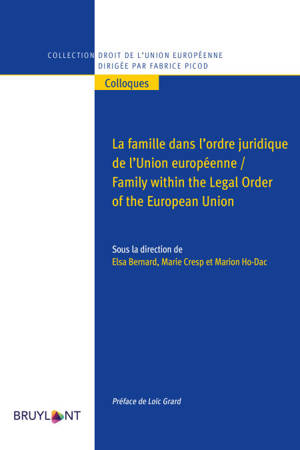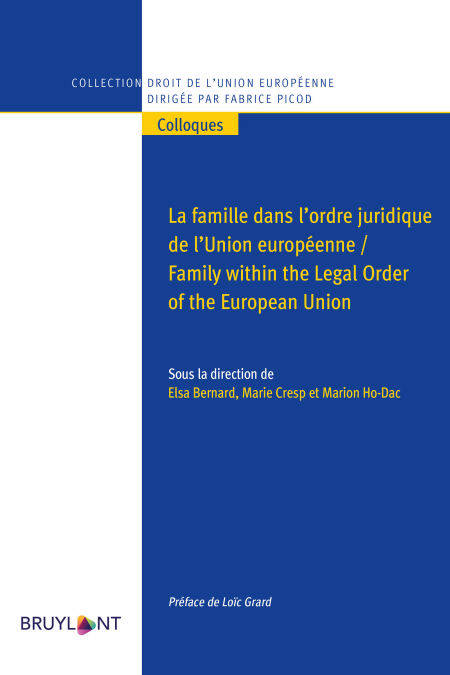
Bedankt voor het vertrouwen het afgelopen jaar! Om jou te bedanken bieden we GRATIS verzending (in België) aan op alles gedurende de hele maand januari.
- Afhalen na 1 uur in een winkel met voorraad
- In januari gratis thuislevering in België
- Ruim aanbod met 7 miljoen producten
Bedankt voor het vertrouwen het afgelopen jaar! Om jou te bedanken bieden we GRATIS verzending (in België) aan op alles gedurende de hele maand januari.
- Afhalen na 1 uur in een winkel met voorraad
- In januari gratis thuislevering in België
- Ruim aanbod met 7 miljoen producten
Zoeken
La famille dans l’ordre juridique de l’Union européenne / Family within the Legal Order of the European Union E-BOOK
€ 104,99
+ 104 punten
Uitvoering
Omschrijving
Le droit de la famille, dans sa dimension civiliste, fortement ancré dans les cultures nationales des États membres, est une matière qui ne relève pas, en principe, du droit de l’Union européenne. Pourtant, il n’est plus possible d’affirmer que la matière échappe dans son entier au droit de l’Union. De nombreux aspects de la famille sont sous influence européenne, au point que l’on voit se dessiner les contours d’une « famille européenne ». L’ouvrage propose de mettre en lumière l’acquis européen en matière de droit de la famille, au prisme du droit matériel (citoyenneté européenne, politique sociale de l’Union, fonction publique européenne…), comme du droit international privé. Le droit de la famille de l’Union s’identifie alors comme un «droit spécial» complétant la diversité des droits nationaux de la famille. Sa signification théorique et politique dans l’Union est débattue par les auteurs, autant que son devenir. Loin de demeurer fragmentaire à côté des droits nationaux des États membres, il a probablement vocation à se densifier pour offrir aux citoyens et résidents européens un droit commun de la famille au sein de l’Union.
Family law, with its civil law tradition, and strong roots in the national cultures of the Member States, does not normally fall within the scope of European law. However, it is no longer possible to argue that family law is outside European law entirely. There are many aspects of the family which are subject to European influence, to the point that the outlines of a «European family» are starting to emerge. This book is intended to highlight the European experience of family law and its substantive (i.e. European citizenship, EU social policy, EU civil service…) and private international law aspects. Union law therefore contains a form of «special» family law which is shared between the Member States and supplements their national family laws. Its theoretical and political importance in the Union, as well as its future, are discussed by the authors. Far from remaining fragmented alongside the national laws of Member States, it will likely develop to offer European citizens and residents a common family law within the EU.
Family law, with its civil law tradition, and strong roots in the national cultures of the Member States, does not normally fall within the scope of European law. However, it is no longer possible to argue that family law is outside European law entirely. There are many aspects of the family which are subject to European influence, to the point that the outlines of a «European family» are starting to emerge. This book is intended to highlight the European experience of family law and its substantive (i.e. European citizenship, EU social policy, EU civil service…) and private international law aspects. Union law therefore contains a form of «special» family law which is shared between the Member States and supplements their national family laws. Its theoretical and political importance in the Union, as well as its future, are discussed by the authors. Far from remaining fragmented alongside the national laws of Member States, it will likely develop to offer European citizens and residents a common family law within the EU.
Specificaties
Betrokkenen
- Uitgeverij:
Inhoud
- Taal:
- Engels
- Reeks:
Eigenschappen
- Productcode (EAN):
- 9782802768968
- Verschijningsdatum:
- 30/12/2020
- Uitvoering:
- E-book
- Formaat:
- ePub

Alleen bij Standaard Boekhandel
+ 104 punten op je klantenkaart van Standaard Boekhandel
Beoordelingen
We publiceren alleen reviews die voldoen aan de voorwaarden voor reviews. Bekijk onze voorwaarden voor reviews.








